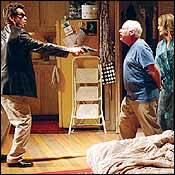
The television producer-director Michael Pressman doesn’t resemble a typical Hollywood sharpie. Although he worked for years massaging egos on Picket Fences and Chicago Hope, he’s emerged from the experience with the paunchy contours of a real live human being instead of the coiffed and aerobicized look so common to his tribe. In Frankie & Johnny Are Married, which Pressman wrote, directed, and stars in as a reasonable facsimile of himself, he’s a refreshingly normal presence in a sea of Botoxed narcissists—except it turns out he has his own compulsive core. He’s never worked professionally with his actress wife, Lisa Chess—he’s a big success, she’s struggling for parts—and he thinks a collaboration will enhance their marriage. Against her advice, he directs and self-finances an Equity-waiver production of Terrence McNally’s two-person Frankie and Johnny in the Clair de Lune and casts her opposite their close friend, the TV actor Alan Rosenberg (L.A. Law)—who plays, one hopes for his sake, a worst-case version of himself. Rosenberg turns out to be a horror in rehearsals, and in desperation after a disastrous preview, Pressman steps into the part.
Something similar to all this once actually happened to Pressman, and so the movie should by all rights be a vanity piece. But Pressman breaks it out of the backstage genre by turning it into something much more touching, a comedy about a man who loves his wife so much that he is willing to violate some pretty big taboos—don’t work with your spouse, don’t spend your own money—to prove it. At the same time—and this is what gives the film its antic spark—Frankie & Johnny is a scribbled mash note to showbiz and its (not so sacred) monsters.
“Frankie & Johnny is a scribbled mash note to showbiz and its (not so sacred) monsters.”
There is, for example, a wonderful little throwaway scene with producer Pressman on the set of Chicago Hope trying to calm a bull-goose loony Mandy Patinkin after he’s fought with the show’s director; it’s clear from the way Pressman talks him down that all the actor really craved was sympathy. But Pressman’s most soothing and psychoanalytic ploys don’t work with Rosenberg, who begins rehearsals on an auspicious note—by declaring that he has the hots for Pressman’s wife. Rosenberg embodies every stage actor who ever made it big in TV but holds a grudge against those who went even further; he compares himself, favorably, to so-called friends like Al Pacino, whom he disparages for playing Shylock in Central Park. (“Al should not do Shakespeare.”) He doesn’t bother memorizing the script, announcing that he didn’t become an actor to learn lines. In the film’s most comically unsettling scene, he calls Chess a “fucking bitch” during a read-through, and Pressman, adding to her upset, refuses to throttle the guy. (Pressman may think he’s the Talmudic peacekeeper, but his face is an open book of anxieties.) “Is that how you protect me?” she asks. It’s the key question in their marriage. Throughout the movie, Chess, who gives a highly intelligent and well-crafted performance that complements Pressman’s warm-and-fuzzy tour de force, is the sane one who keeps putting everything in perspective: She knows that Equity-waiver theater is not exactly up there in importance with brain surgery. Her husband’s hopes for her success outstrip her own waning ambition. Turned down for a movie, she tells him, “I’m so tired of not getting parts I didn’t even want”—and she means it. Frankie & Johnny Are Married is a highly affectionate satire of the theater, but it owns up to a dirty little secret: Life is more important than art (but not much).
I realize it’s a tough sell getting anybody to see a semi-documentary called The Story of the Weeping Camel, but trust me—you’ll be weeping right along with the camel. Set in Mongolia’s Gobi Desert, and directed by first-timers Byambasuren Davaa and Luigi Falorni, it stars a real family of herders who summon a musician to perform for the mother Bactrian in a ritualized ceremony that will, they hope, reunite her with the snow-white calf she rejected at birth. It’s a simple and radiant piece of humanism.